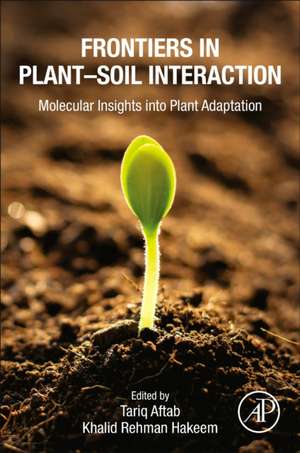Frontiers in Plant–Soil Interaction: Molecular Insights into Plant Adaptation
Editat de Tariq Aftab, Khalid Rehman Hakeemen Limba Engleză Paperback – 10 mai 2021
Frontiers in Plant-Soil Interaction: Molecular Insights into Plant Adaptation will address topics that provide advances in understanding plant responses to soil conditions through the integration of genetic, molecular, and plant-level studies of diverse biotic and abiotic stresses under field and laboratory conditions. This book will be beneficial to students and researchers working on stress physiology and stress proteins, genomics, proteomics, genetic engineering and other fields of plant-soil interactions. Frontiers in Plant-Soil Interaction will also help scientists explore new horizons in their area of research.
- Brings together global leaders working in the area of plant–environment interactions and shares their research findings
- Presents current and future scenarios for the management of stressors
- Illustrates the central role for plant-soil interactions in applying basic research to address current and future challenges to humans
Preț: 917.88 lei
Preț vechi: 1183.95 lei
-22% Nou
Puncte Express: 1377
Preț estimativ în valută:
175.64€ • 181.20$ • 146.57£
175.64€ • 181.20$ • 146.57£
Carte tipărită la comandă
Livrare economică 19 martie-02 aprilie
Preluare comenzi: 021 569.72.76
Specificații
ISBN-13: 9780323909433
ISBN-10: 0323909434
Pagini: 660
Dimensiuni: 152 x 229 mm
Editura: ELSEVIER SCIENCE
ISBN-10: 0323909434
Pagini: 660
Dimensiuni: 152 x 229 mm
Editura: ELSEVIER SCIENCE
Cuprins
1. Plant-Soil Interactions in a Changing World: A Climate Change Perspective
2. Role of Carbon Cycle in Soil Productivity and Carbon Fluxes under Changing Climate
3. Molecular Advances in Plant Root System Architecture Response and Redesigning for Improved Performance under Unfavorable Environments
4. Nanotechnology-Based Biofortification: A Plant-Soil interaction Modulator/ Enhancer
5. Transcription Factors Involved in Plant Responses to Stress Adaptation
6. Nitrate Assimilation: Crosstalk between Plants and Soil
7. Next-Generation Genetic Engineering Tools for Abiotic Stress Tolerance in Plants
8. Omics Approaches for Improving Abiotic Stress Tolerance in Rice: Recent Advances and Future Prospects
9. Interactions of Phytohormones with Abiotic Stress Factors under Changing Climate
10. The Role of Soil Microbes in the Plant Adaptation to Stresses: Current Scenario and Future Perspective
11. CRISPR/Cas Mediated Genome Editing for Improved Stress Tolerance in Plants
12. Photosynthetic and Cellular Responses in Plants under Saline Conditions
13. Physiological and Molecular Strategies of Plant Adaptation in Phosphorous-Deficit Soils
14. Biotic Stresses on Plants: ROS Generation and Antioxidant Mechanism
15. Physiological Mechanisms and Adaptation Strategies of Plants under Heavy Metal Micronutrient Deficiency/Toxicity conditions
16. Halophytes as Effective Tool for Phyto-desalination and Land Reclamation
17. Role of Nickel in Regulation of Nitrogen Metabolism in Legume-Rhizobium Symbiosis under Critical Conditions
18. Beneficial Aspects of Cobalt Uptake in Plants Exposed to Abiotic Stresses
19. Iron in Soil-Plant-Human Continuum
20. The Molecular Mechanism of Brassinosteroids in Mediating Abiotic Stress Responses of Plants
21. Emerging Roles of Osmoprotectant Glycine Betaine against Salt-Induced Oxidative Stress in Plants: A Major Outlook of Maize (Zea mays L.)
22. Eco-Designing for Ecological Sustainability
2. Role of Carbon Cycle in Soil Productivity and Carbon Fluxes under Changing Climate
3. Molecular Advances in Plant Root System Architecture Response and Redesigning for Improved Performance under Unfavorable Environments
4. Nanotechnology-Based Biofortification: A Plant-Soil interaction Modulator/ Enhancer
5. Transcription Factors Involved in Plant Responses to Stress Adaptation
6. Nitrate Assimilation: Crosstalk between Plants and Soil
7. Next-Generation Genetic Engineering Tools for Abiotic Stress Tolerance in Plants
8. Omics Approaches for Improving Abiotic Stress Tolerance in Rice: Recent Advances and Future Prospects
9. Interactions of Phytohormones with Abiotic Stress Factors under Changing Climate
10. The Role of Soil Microbes in the Plant Adaptation to Stresses: Current Scenario and Future Perspective
11. CRISPR/Cas Mediated Genome Editing for Improved Stress Tolerance in Plants
12. Photosynthetic and Cellular Responses in Plants under Saline Conditions
13. Physiological and Molecular Strategies of Plant Adaptation in Phosphorous-Deficit Soils
14. Biotic Stresses on Plants: ROS Generation and Antioxidant Mechanism
15. Physiological Mechanisms and Adaptation Strategies of Plants under Heavy Metal Micronutrient Deficiency/Toxicity conditions
16. Halophytes as Effective Tool for Phyto-desalination and Land Reclamation
17. Role of Nickel in Regulation of Nitrogen Metabolism in Legume-Rhizobium Symbiosis under Critical Conditions
18. Beneficial Aspects of Cobalt Uptake in Plants Exposed to Abiotic Stresses
19. Iron in Soil-Plant-Human Continuum
20. The Molecular Mechanism of Brassinosteroids in Mediating Abiotic Stress Responses of Plants
21. Emerging Roles of Osmoprotectant Glycine Betaine against Salt-Induced Oxidative Stress in Plants: A Major Outlook of Maize (Zea mays L.)
22. Eco-Designing for Ecological Sustainability
